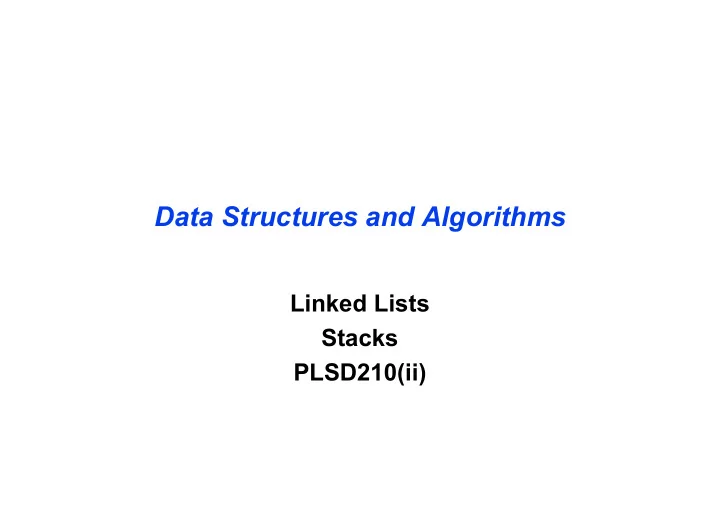

Data Structures and Algorithms Linked Lists Stacks PLSD210(ii)
Array Limitations • Arrays • Simple, • Fast but • Must specify size at construction time • Murphy’s law • Construct an array with space for n • n = twice your estimate of largest collection • Tomorrow you’ll need n +1 • More flexible system?
Linked Lists • Flexible space use • Dynamically allocate space for each element as needed • Include a pointer to the next item Linked list • Each node of the list contains • the data item (an object pointer in our ADT) • a pointer to the next node Data Next object
Linked Lists • Collection structure has a pointer to the list head • Initially NULL Collection Head
Linked Lists • Collection structure has a pointer to the list head • Initially NULL • Add first item • Allocate space for node • Set its data pointer to object • Set Next to NULL • Set Head to point to new node Collection node Head Data Next object
Linked Lists • Add second item • Allocate space for node • Set its data pointer to object • Set Next to current Head • Set Head to point to new node Collection Head node node Data Next Data Next object2 object
Linked Lists - Add implementation • Implementation struct t_node { void *item; struct t_node *next; } node; typedef struct t_node *Node; struct collection { Node head; …… }; int AddToCollection( Collection c, void *item ) { Node new = malloc( sizeof( struct t_node ) ); new->item = item; new->next = c->head; c->head = new; return TRUE; }
Linked Lists - Add implementation • Implementation struct t_node { void *item; Recursive type definition - struct t_node *next; C allows it! } node; typedef struct t_node *Node; struct collection { Node head; …… }; int AddToCollection( Collection c, void *item ) { Node new = malloc( sizeof( struct t_node ) ); new->item = item; new->next = c->head; c->head = new; Error checking, asserts return TRUE; omitted for clarity! }
Linked Lists • Add time • Constant - independent of n • Search time • Worst case - n Collection Head node node Data Next Data Next object2 object
Linked Lists - Find implementation • Implementation void *FindinCollection( Collection c, void *key ) { Node n = c->head; while ( n != NULL ) { if ( KeyCmp( ItemKey( n->item ), key ) == 0 ) { return n->item; n = n->next; } return NULL; } • A recursive implementation is also possible!
Linked Lists - Delete implementation • Implementation void *DeleteFromCollection( Collection c, void *key ) { Node n, prev; n = prev = c->head; while ( n != NULL ) { if ( KeyCmp( ItemKey( n->item ), key ) == 0 ) { prev->next = n->next; return n; } prev = n; n = n->next; head } return NULL; }
Linked Lists - Delete implementation • Implementation void *DeleteFromCollection( Collection c, void *key ) { Node n, prev; n = prev = c->head; while ( n != NULL ) { if ( KeyCmp( ItemKey( n->item ), key ) == 0 ) { prev->next = n->next; return n; } prev = n; n = n->next; head } return NULL; } Minor addition needed to allow for deleting this one! An exercise!
Linked Lists - LIFO and FIFO • Simplest implementation • Add to head Last-In-First-Out (LIFO) semantics • Modifications • First-In-First-Out (FIFO) • Keep a tail pointer head struct t_node { tail void *item; struct t_node *next; } node; tail is set in typedef struct t_node *Node; the AddToCollection struct collection { method if Node head, tail; head == NULL };
Linked Lists - Doubly linked • Doubly linked lists • Can be scanned in both directions struct t_node { void *item; struct t_node *prev, *next; } node; typedef struct t_node *Node; struct collection { Node head, tail; }; head prev prev prev tail
Stacks • Stacks are a special form of collection with LIFO semantics • Two methods • int push( Stack s, void *item ); - add item to the top of the stack • void *pop( Stack s ); - remove an item from the top of the stack • Like a plate stacker • Other methods int IsEmpty( Stack s ); /* Return TRUE if empty */ void *Top( Stack s ); /* Return the item at the top, without deleting it */
Stacks - Implementation • Arrays • Provide a stack capacity to the constructor • Flexibility limited but matches many real uses • Capacity limited by some constraint • Memory in your computer • Size of the plate stacker, etc • push, pop methods • Variants of AddToC…, DeleteFromC… • Linked list also possible • Stack: • basically a Collection with special semantics!
Stacks - Relevance • Stacks appear in computer programs • Key to call / return in functions & procedures • Stack frame allows recursive calls • Call: push stack frame • Return: pop stack frame • Stack frame • Function arguments • Return address • Local variables
Stacks - Implementation • Arrays common • Provide a stack capacity to the constructor • Flexibility limited but matches many real uses struct t_node { void *item; • Stack created with limited capacity struct t_node *prev, prev is optional! *next; } node; typedef struct t_node *Node; struct collection { Node head, tail; }; head prev prev prev tail
Recommend
More recommend